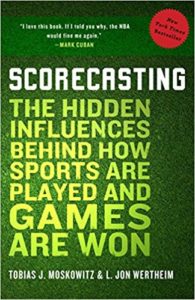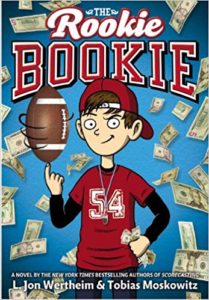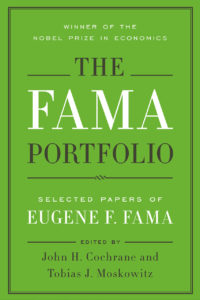Scorecasting: The Hidden Influences Behind How Sports Are Played and Games Are Won


In Scorecasting, University of Chicago behavioral economist Tobias Moskowitz teams up with veteran Sports Illustrated writer L. Jon Wertheim to overturn some of the most cherished truisms of sports, and reveal the hidden forces that shape how basketball, baseball, football, and hockey games are played, won and lost.
Drawing from Moskowitz’s original research, as well as studies from fellow economists such as bestselling author Richard Thaler, the authors look at: the influence home-field advantage has on the outcomes of games in all sports and why it exists; the surprising truth about the universally accepted axiom that defense wins championships; the subtle biases that umpires exhibit in calling balls and strikes in key situations; the unintended consequences of referees’ tendencies in every sport to “swallow the whistle,” and more.
Among the insights that Scorecasting reveals:
• Why Tiger Woods is prone to the same mistake in high-pressure putting situations that you and I are
• Why professional teams routinely overvalue draft picks
• The myth of momentum or the “hot hand” in sports, and why so many fans, coaches, and broadcasters fervently subscribe to it
• Why NFL coaches rarely go for a first down on fourth-down situations–even when their reluctance to do so reduces their chances of winning.
In an engaging narrative that takes us from the putting greens of Augusta to the grid iron of a small parochial high school in Arkansas, Scorecasting will forever change how you view the game, whatever your favorite sport might be.
The Rookie Bookie

Using the tips, truths, and stats they explore in their New York Times bestseller Scorecasting, two dads pack super sports savvy and important math and financial concepts into a fun and heartwarming first novel for kids.
The Fama Portfolio: Selected Papers of Eugene F. Fama


Few scholars have been as influential in finance and economics as University of Chicago professor Eugene F. Fama. Over the course of a brilliant and productive career, Fama has published more than one hundred papers, filled with diverse, highly innovative contributions.
Published soon after the fiftieth anniversary of Fama’s appointment to the University of Chicago and his receipt of the Nobel Prize in Economics, The Fama Portfolio offers an authoritative compilation of Fama’s central papers. Many are classics, including his now-famous essay on efficient capital markets. Others, though less famous, are even better statements of the central ideas. Fama’s research considers key questions in finance, both as an academic field and an industry: How is information reflected in asset prices? What is the nature of risk that scares people away from larger returns? Does lots of buying and selling by active managers produce value for their clients? The Fama Portfolio provides for the first time a comprehensive collection of his work and includes introductions and commentary by the book’s editors, John H. Cochrane and Tobias Moskowitz, as well as by Fama’s colleagues, themselves top scholars and successful practitioners in finance. These essays emphasize how the ideas presented in Fama’s papers have influenced later thinking in financial economics, often for decades.

